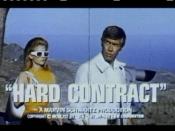The plaintiff will argue that the plaintiff had a written contract of $33000 with Steve by which the plaintiff allowed Steve to operate his carousel for the seven days the Show was open to the public. The plaintiff had performed all contractual obligations including providing outdoor lighting, continuous security services, regular rubbish collection services and free electricity for the duration of the show, access to the site for 7 days before and after the period the show is open to the public, allowing no one except Steve to operate a carousel at the Show. Therefore the plaintiff has the right to recover the contract price. This case is very similar to Hoeing v Isaacs. Hoeing hired Isaacs to do some renovations on his house. When the work was done, Hoeing refused to pay Isaacs, claiming that Isaacs had done all the renovations but not appropriately. The court entitled Isaacs the contract price less the amount to bring the work up to the proper standard.
In this case, the plaintiff has performed all the contract specifications, hence the plaintiff can claim total amount of the contract price. Furthermore, clause 7 in the contract states that the defendant operated his carousel for at least 8 hours each day that the Show was open to the public. Clause 7 is a condition of the contract because without this clause, the plaintiff would not enter the contract with the defendant. The fact is that the defendant did not operate his carousel from the very first day of the Sow, which seriously breached clause 7. Therefore, the plaintiff can claim for damages, which is the price of the contract.
The defendant will argue that he admitted he had a contract of $33,000 with the plaintiff. He had a certificate for his carousel,


